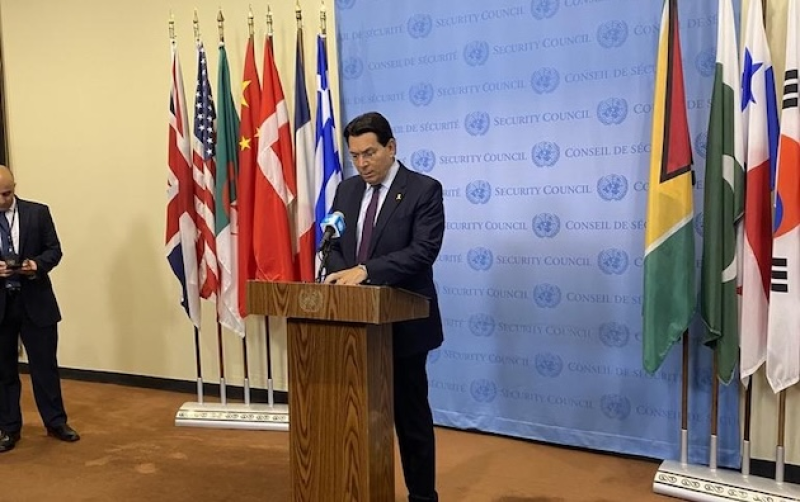- India Sees 9% Drop in Foreign Tourists as Bangladesh Visits Plunge |
- Dhaka Urges Restraint in Pakistan-Afghan War |
- Guterres Urges Action on Safe Migration Pact |
- OpenAI Raises $110B in Amazon-Led Funding |
- Puppet show enchants Children as Boi Mela comes alive on day 2 |
The Gaza Crisis Shows Why Multilateralism Is Failing

Permanent Representative of Israel to the United Nations Danny Denon speaks to members of the press at a media stakeout before a Security Council meeting on the Middle-East.
“Multilateralism is not an option but a necessity as we build back a better world with more equality, resilience, and sustainability.”
Secretary-General António Guterres is not the first to praise multilateralism—the practice of collective action among multiple international actors—and he will not be the last. However, during his tenure as the UN’s political leader, Guterres has faced significant obstacles, especially in humanitarian aid efforts. This failure largely stems from dissenting member states whose power and influence hinder constructive progress.
This resistance is best exemplified by Israel and recent disputes between the country and the UN concerning food, humanitarian aid, and the Gaza Humanitarian Foundation (GHF), a US-Israeli aid organization condemned by hundreds of humanitarian NGOs.
Guterres has repeatedly called for multilateral aid and cooperation in the region, urging Israel at a recent media briefing to allow UN humanitarian aid into Gaza, which he said has been blocked “for over three months.”
Israel, however, views the GHF as the only viable food source in the area. Shahar Segal, GHF spokesperson, called the organization the only “right and possible way” to deliver aid “without feeding Hamas’ terror machine.”
The US similarly supports the GHF and used its Security Council veto to block a resolution requiring the lifting of aid restrictions in Gaza. This stalemate has not only intensified conflicts within the UN but weakened the principle of multilateralism on which the organization was founded to prevent global wars.
A rejection of multilateralism is unsurprising. As the US Representative stated at a recent General Assembly meeting on the Responsibility to Protect doctrine, “The United States will always act in accordance with our national interest and will not subordinate our sovereignty to shifting international norms.”
Many American lobbyists question claims that international issues are irrelevant to national interests.
Hassan El-Tayyab, Legislative Director for Middle East Policy at the Friends Committee on National Legislation and co-chair of the US Ceasefire Coalition, explained to IPS how US law intersects with international law.
For example, International Humanitarian Law deems blocking humanitarian aid unlawful, and under the Foreign Assistance Act, the US must block offensive weapons sales to countries that obstruct its humanitarian aid.
El-Tayyab said this legal strategy “gets at accountability, but we’re using a US law framework, which can be more palatable to these members.”
This isolationist approach reflects a broader global loss of trust in international law and multilateralism. The US has imposed sanctions on the International Criminal Court (ICC) and rejected UN humanitarian efforts, while countries like Russia have criticised the ICC as neocolonial.
Jamil Dakwar, human rights lawyer and adjunct professor at New York University and Hunter College, acknowledged flaws in institutions like the ICC and International Court of Justice (ICJ). He said, “There is a history of international institutions not taking human rights violations in the global North seriously or holding powerful governments accountable, especially the US after 9/11.”
Dakwar noted this double standard undermines legitimacy and effectiveness of international institutions, including the UN system.
However, he also criticised governments ignoring international law, saying, “That is not an excuse for others to flout international law.”
He emphasised these institutions play a vital role in upholding international law “where diplomacy fails,” blaming major powers for taking matters into their own hands.
El-Tayyab described this attitude as “an à la carte approach to the charter,” where countries treat international mandates as suggestions rather than obligations, eroding systems designed to prevent conflict.
Dakwar said wealthy countries “bully” global South nations, forcing concessions out of fear.
He added, “Many remain silent on violations because of the consequences, but this silence harms everyone, affecting migration, climate, and humanity.”
Both El-Tayyab and Dakwar strongly support multilateralism but stress it must be applied impartially and focus on humanity, not political gain.
For multilateralism to succeed in promoting peace and unity, all countries must set aside national interests for global welfare.
Moreover, the UN must prioritise marginalized countries in the global South to ensure wider participation.
As El-Tayyab put it, “All politics is local, and these member states make up the UN. The UN is us, in a way.” True multilateralism requires including all voices.

